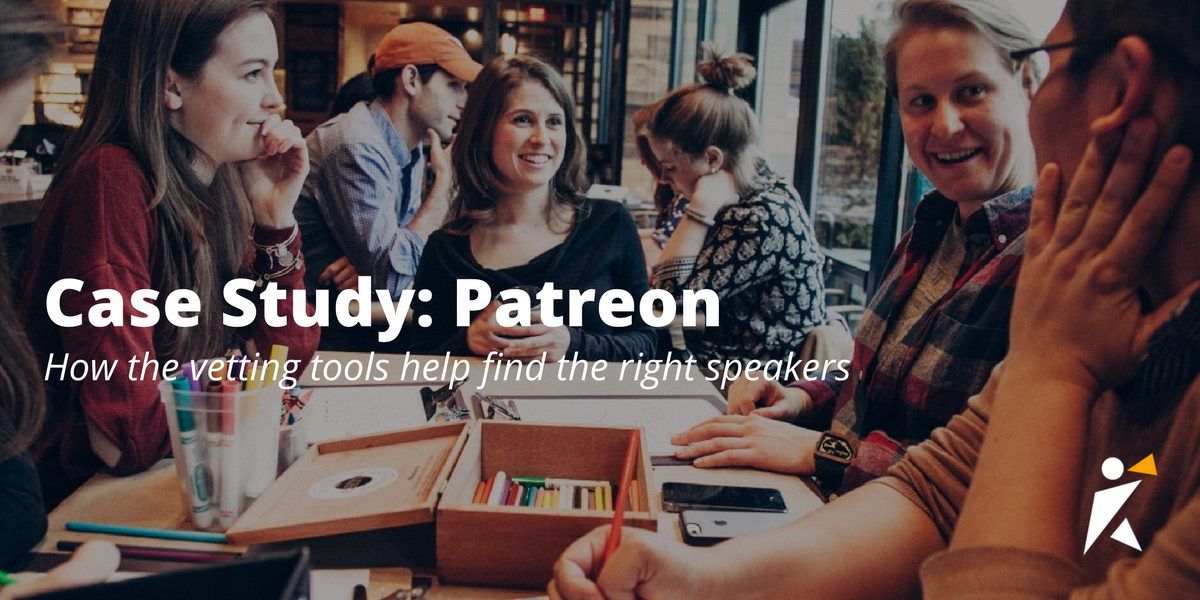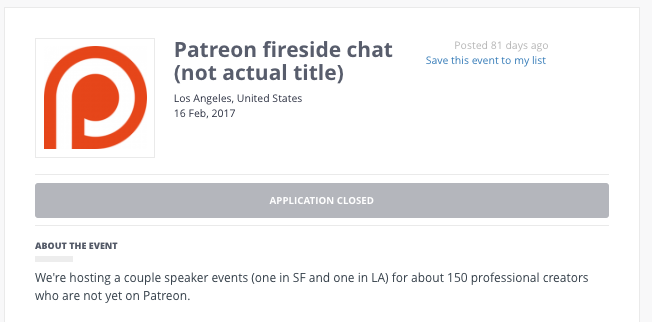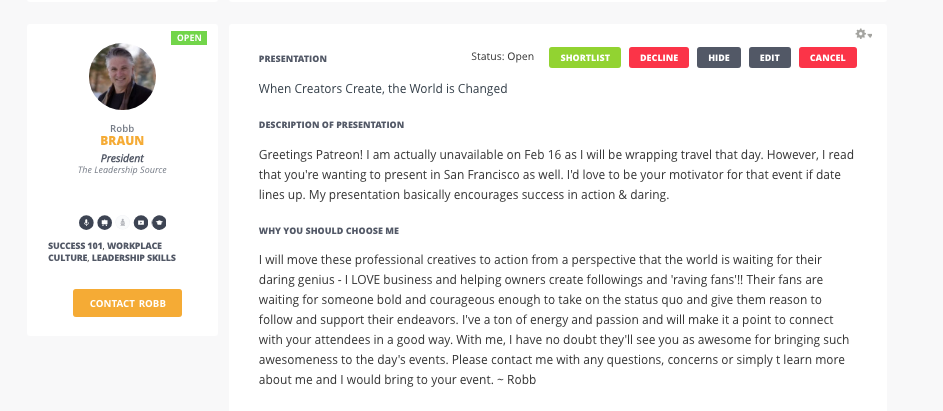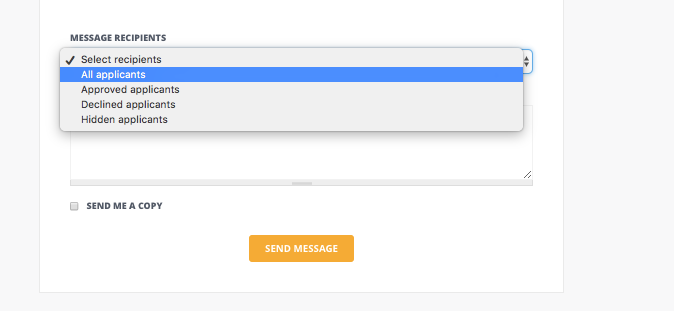Patreon Case Study: How the vetting tools help find the right speakers

Helping event organizers find the right speakers for their events is at the heart of what we are doing at SpeakerHub.
It’s a challenging and time-consuming process to reduce a list of potential speakers to the one, or few, that you actually need.
Speakers are a huge factor in determining whether a conference or workshop is a success because they must communicate their message and connect with attendees.
Positive word-of-mouth is necessary if more events are to follow. So you need to know that your vetting process helps you hire the ideal speaker.
SpeakerHub is designed to connect you with potential speakers, but we don’t stop there.
The platform is specifically designed to assist you throughout the vetting and the event planning phase.
By making informed decisions, you improve the likelihood of a successful event.
So how do these tools work, and how can they help you?
Here is a recent success story of an event which benefited from using SpeakerHub’s vetting tools: Patreon’s Fireside Chat.

You’ve got speaker applicants: now what?
Background:
Patreon is a crowdfunding site that assists creative individuals such as writers, artists and musicians to create a source of income via their respective craft.
Creativity is one of their central values, and they are strong believers in empowering people to make the most of their skills.
Patreon planned a Fireside Chat where 150 individuals — not yet part of the Patreon network — would come together.
They were looking for people to inspire this new audience and show them how the concept of Patreon (using the appropriate marketing skills and hard work) can turn creativity into successful businessopportunities.
Faced with many inspiring applicants, it was vital that the event organizers were able to dive into enough detail about each applicant before an informed decision could be made.
This is where our application management and vetting tools came in.
The risk of working with an unfamiliar speaker
The risk Patreon took when advertising their event was the organizers needed to trust unknown speakers to deliver messages in line with the central goal of the event.
During the Fireside Chat the organizers needed speakers to share their success stories about how they turned their skills into businesses, with hard work and commitment to their creative talents and crafts.
This is a unique approach and Patreon needed to know whether the speakers:
- Were creative individuals who understood the unique challenges artistic people face in the workplace
- Have overcome adversity through working hard so that this message could be carried across during their sessions
Due to the unique audience and theme it wasn’t possible to simply draw speakers from known sources because:
- Many well-known speakers may teach about success, but not necessarily about creativity.
- High-profile speakers almost invariably ask a higher speaker fee than what Patreon was able to offer for this event.
If you have a few speakers who you think might be the right fit, you can invite them to apply for your event by hitting the “invite” tab. We even go the extra mile by suggesting speakers we think might be a good fit, based on the topic of your event.

When you post an event to the Event Page, we will also send a notification to speakers who we think might be interested in applying, to make sure you get as many passionate speakers to send in their applications as possible.
But once they got a handful of great applicants, how could Patreon determine who would be the best fit to inspire this creative group?
How could they pick the best from the bunch?
Tools to decide on the right applicant
Patreon made use of a range of vetting tools on the SpeakerHub platform, specially designed for event organizers.
These tools are freely available to any organizer posting an event.
It helps organizers see who on the list of applicants stand out above others in quality and who is most likely to fulfil the expectations set for the event.
What tools are available for event organizers?
1. Proposals specific to your event
When the speaker applies for your event, we make sure that the information they supply you with is customized to your event.
Some of the information is automatically pulled in (such as their topics, date of application) but some of the fields need to be filled in, such as:
- the name of the presentation they’d give at your event
- a description of their presentation,
- and a “why choose me” pitch.
You will be able to see instantly who has put time, thought and effort into their application. Take a look at the application Robb Braun sent to Patreon below:

2. Free access to multimedia-rich, speaking-centric profiles
It is possible to search on resources like LinkedIn or Google for speakers, and you may even find many great presenters. Finding out about their speaking abilities, and whether they are available and suitable for your event may prove to be much more difficult.
With our speaker profiles, all the information you need to make the right decision is centralized in one place.
The event organizers for Patreon could view all applicants’ profiles in one place.
SpeakerHub profiles are the one-stop shop for finding out all the relevant info about a speaker.
Here is what they include:
- - Are they a safe bet?
- “Why choose me?” statement is the elevator pitch: In 20-seconds you’ll get the gist of what they do.
- Testimonials: speakers can upload their own, or have past organizers write them directly on their profile (verified).
- Community recommendations: Social credit at its core, but tailored specifically for their ability to present.
- Their social networks: Are they influential? What is their online presence like? Do they have a strong follower base? Find out by reviewing their social accounts.
- - Who are they, and do they know their stuff?
- Bio: Who you are they and what have they done? Get the cliff notes here.
- Current position: Have they worked on similar projects? Find out what they are currently working on, and what they have worked on in the past.
- Degrees: Proof they’ve got the expertise and education.
- Books & Articles: Are they a trend setter? Do they have the right tone? Find out by looking at their latest publications.
- Awards & certifications are great proof of their training and expertise on the speaker’s topics.
- - What do they talk about? Is it relevant?
- Topic Tags: do they talk about your topic specifically, or do they talk about everything and anything? Check out what they consider their expertise are, and see if this fits with your event.
- Types of presentations: find out what kind of presentations they do. If they only do webinars, and you are looking for a keynote (or vice versa) they might not be the right fit.
- The Fireside Chat incorporated both workshops and conference sessions. Workshops are a great tool when working with creative individuals and this activity added much value to Patreon’s selection process. It was very important to determine whether the applicants knew how to facilitate a workshop.
- Videos: These are important for two reasons, you can see what they look and sound like, and you can also check their content: use this to decide whether they are right fit for your event and audience.
- Slides: These are the visual components of their presentations. Take a look through: what do you think of the style and content? If you are interested in finding out more, they might be the right fit for you.
- One-Sheet: The one-sheet is a printable document that give you the highlights of what the speaker is all about.
3. Contact the speaker directly
Making contact with applicants was found to be a valuable tool to narrow the list of applicants down even more.
Organizers garnered information by asking applicants questions. This was essential since external speakers were tasked with communicating the heart of Patreon.
Patreon also wanted speakers who have used and loved the Patreon platform. Through communication the speaker directly, their level of knowledge and enthusiasm could be appropriately assess.
Personal questions can reveal much about a person. Via personal messages to applicants organizers got to know more details about possible speakers.

Organizers could plan how this information could be worked into their event to make the biggest impact and benefit attendees.
Applicants whose profiles showed their success in the business world could be asked how their creative talents were used in their journeys, since this was a vital part of the Fireside Chat’s vision.
Organizers could talk to the whole group of applicants by sending them a group message, or send individual messages only to the ones they were most curious about.

4. Shortlist, approve, decline or hide applicants
After reading the application, looking through the speaker’s profile, and contacting the speakers they wanted to know more about, the organizers could classify each applicant into a category.
These categories included:
- Shortlisted: Strong potential. Let’s see bilaterally if it can work out.
- Declined: Sorry, but definitely a no.
- Hide: Not the best but rather not turn down as of yet.
Through this feature organizers kept track of applicants during the vetting process.
Once you approve or decline an applicant, they will get a notification letting them know of the change.
Results after using these tools
- Our online tools assisted Patreon in vetting the hopeful applicants down to the select few for the Fireside Chat.
- A process which started with unfamiliar applicants developed into a journey of getting to know each other and acquiring in-depth knowledge of speakers.
- This is important for the success of an event, especially such a small one where the attendees need to feel looked after in the same way the Patreon platform looks after its users.
- Applications and vetting happened on a single platform so there was no need to transfer or capture information from elsewhere.
- Organizers saved time working through the profiles so that speakers could be booked well in advance.
Conclusion
Is it possible to have a fast and hassle-free vetting process that offers a selection of speakers based upon relevant and adequate knowledge?
A well-constructed vetting system can assists you by giving you access to the relevant information you need to make the right choice.
The benefits Patreon found:
- Time was saved due to the streamlined process.
- Creative and dynamic speakers who wanted to share their stories and skills were sourced.
- A quality event with the correct type of speaker was held because organizers could gauge the characteristics of individuals who they didn’t meet previously.
Make it easy for yourself and post your event on SpeakerHub today. You’ll be kicking off a dynamic process!